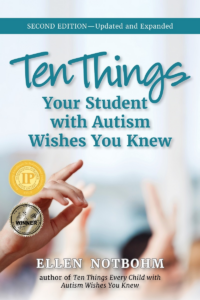School can be stressful for children with autism, and for their parents too. Get empowered by having the right strategies to assist with better energy, clearer thinking and ability to focus, as well as calmer behaviors and better social engagement. It’s also important to know your rights. Here we cover the most vital strategies for your child’s greatest success.
1. Parent Help With School Advocacy-504 vs IEP
We know that the needs of each child are very different. For this reason, you as a parent are your child’s best advocate. If you’ve been getting calls from the school about your child’s behavior or told that your child is having difficulty in class with anything including a particular subject, or your child needs emotional support because they experience anxiety or other issues, then it’s a good time to ask for help for them.
Know that in most states a staff member of the school, including teachers, cannot legally say they suspect there is an issue with your child. A staff member of the school cannot even say they think your child has a learning disability or needs help.
A parent begins by writing a letter to the school making a written request. This cannot just be verbal. It needs to be in writing so there is a paper trail and proof you’ve asked.
In this letter, you as the parent, say that your child may be having issues in school and that you suspect they may have a learning disability. Do not specify autism. Just ask for an assessment to be done by the school. Under the Americans with Disabilities Act the school must provide a free evaluation, and then assistance based on those results.
Once the results of the evaluation are in, then the decisions are made around how to reach the best success for that individual child.
504 vs. IEP
IEP and 504 plans help to educate staff on campus about the special individual needs of a child to ensure the greatest success.
504 and IEP plans are funded by the school and completely free. They are also required to be given under law due to the disabilities act.
Higher functioning children will often be given a 504 plan which help them have special “privileges” in a classroom such as an ipad to type if they cannot handwrite, and anything that helps the child focus and learn better. Unlike an IEP, parents who wish for a 504 plan for their child cannot request independent educational evaluations (IEEs) if they disagree with the results of the school district’s evaluation.
IEP stands for Individualized Education Program. Children with more needs will often have an IEP plan for school. IEP is a more specialized than a 504 plan. An IEP often has a school aid assigned to a child, or offers therapies to help them.
Working along with the staff at your child’s school can be very helpful. Teachers and therapists often want to help but don’t know how and they don’t know what your child needs.
Every parent can help provide the school staff with the best tools for your child. Meet with your child’s teachers and other school staff as soon as you can either before school begins or shortly after.
Everyone should be present in your child’s 504 or IEP meeting to be informed of the child’s needs and what signs to look for. When the child is at school it is important for the teachers and staff to also be informed of the child’s needs and give them to him or her.
Let the staff know what helps your child to relax, be able to focus better, and what helps calm them if they get stressed.
Sitting at the front of the classroom allows for less external stimuli between the child and the teacher. Remember that when a child on the autism spectrum is asked a question, he will often need an extra moment to process the information before answering. Give this moment to him.
A child, if able, can also be their own self-advocate asking to go to a quiet room to take a test, or asking for extra time to turn in schoolwork.
School can be an emotional time for everyone. Some initial steps to take are:
- Get your child’s information ready.
- Meet with the staff and share what the child’s needs are and what they should be getting.
- Prepare your child for school.
- Prepare yourself as a parent.
Know your legal rights. See resources at bottom of this page for more links.
2. Top Book Choice To Give To School Staff
Give the small book, Ten Things Your Student With Autism Wishes You Knew by Ellen Notbohm to all of your child’s teachers. This proved to be a valuable asset for our family and my son’s teachers.
The book, Ten Things Your Student With Autism Wishes You Knew is written from the perspective of a child with autism, this book provides insight into helping a child have greater success in school and contains accolades such as Gold Medal, Independent Publisher Book Awards, Nonfiction Series.

This book has been around since 2006. I myself used it to assist teaching my son’s school staff back when he was in middle school and high school along with Ellen Notbohm’s other book, Ten Things Every Child with Autism Wishes You Knew.
3. Calming Sensory Issues with Exercise
Any exercise helps. A child should NEVER have recess taken away from them as a punishment by a teacher or staff member. They need to get outdoors and move their body!
Inform your child’s teacher to always let your child exercise when recess comes. Asking a behavioral child to sit in a classroom and miss recess as punishment is one of the worst things you can do. Part of the problem for a child on the autism spectrum is sitting too much and sensory overload. He needs to release all that energy. The pull-up bars, and running can both be very calming.
The weight on your child’s muscles from carrying a heavy box can calm his nervous system too. Have a box strategically weighted (such as with some books in it) and set it somewhere in his classroom. As his anxiety, irritability, and inability to focus creep up, suggest that the teacher ask him to carry the box down the hall to another classroom for them.
There are important sensory processing issues for parents and caregivers to become aware of, and what can be done about them, so you can better help your children and yourself. Sensory overload is common in children with autism.
In podcast episode #13, I interviewed a sensory processing expert, Lindsey Biel. In this interview we address many questions parents ask such as:
- What are the different types of sensory processing disorders that a person can have?
- What can be done about it?
I’ve also created a free download for you, “At-Home Play Ideas That Help Calm Sensory Issues”.
4. Give A Protein Snack
Beware of hypoglycemia, or blood sugar imbalance. This will trigger behavior issues. Your child should be given a protein snack that is NOT loaded with sugar such as almonds to help balance his blood sugar and help his brain think better.
IMPORTANT NOTE: Protein helps us think better, carbohydrates reduce the ability to think but make us a bit more compliant. An apple with almond butter can be a good choice if more compliance is needed, but NEVER leave out the protein, or attention and focus issues will quickly become worse.
A few simple foods ‘to go’:
- Celery or apple slices with almond butter
- Hard-boiled eggs
- All nuts (except peanuts and cashews).
- Lettuce wraps: fresh turkey meat with chevre wrapped in romaine hearts that act like ‘bread’.
- Pureed on-the-go nutritious foods from Serenity at, NaturallyRecoveringAutism.com/food. Puréed foods and some healthier crunchy snacks are good when you need something easy on the gut with good nutrition that’s more easily absorbable. Serenity carries grain free vege puffs, organic pureed vegetable pouches, and pureed meat pouches.
- Healthy protein bars such as these keto bars are really good protein bars. Use this link which will give you a one time coupon code emailed to you for $10 off your next purchase.
Remove the bad inflammatory foods from your child’s diet. The gut controls the brain and the immune system so to help your child think and focus better and stay more calm you must remove these bad foods. Get my free guide now to the top 7 foods to eliminate from your child’s diet for better ability to focus and concentrate, improved sleep, calmer behaviors and much more.
5. Work With underlying Toxins and Coinfections
Also, be sure your home is mold free. Mold biotoxins from water damaged buildings can cause many behavioral issues and trigger some autoimmune issues such as PANS.
PANS is an acronym for Pediatric Autoimmune Neuropsychiatric Syndrome. It is when the immune system becomes overactive and begins attacking the brain. This can be triggered by pathogens, toxins and infections. Detoxifying too rapidly can also trigger PANS since the immune system goes into overdrive.
The underlying pathogens and toxins take an effect on our central nervous system. Parents may notice a sudden onset of symptoms such as obsessive compulsive disorder (OCD), or tiks. Tiks can be motor tiks where their body jerks rapidly, (not wiggling), or vocal tiks.
PANS and mold biotoxins can effect our fine motor skills such as handwriting which becomes very stressful for the child. A simple device such as a pencil grip or a weighted pencil may be helpful for them, but there is more work to do with the underlying root causes.
Additional symptoms include separation anxiety, a decline in school such as in their reading and math abilities, simplified language, baby talk, bed wetting, and increased urination, aggression, and anxiety with stress.
The good news is that these pathogens and infections can be worked with naturally. To give you an idea of how much they affect the brain’s ability in cognitive function and to do things such as write and do math, one mom I helped in my program as we worked with these pathogens had something very inspiring she wanted to share.
She wrote:
“I honestly thought 3 months ago that my daughter would need a scribe going forward in school because she absolutely hated picking up a pencil and making an attempt to write. She couldn’t get the formation of the letter without tracing. She couldn’t get the formation of numbers. She just couldn’t plan the formation in her head. It was causing her dreadful stress and she avoided coloring and all writing. I really thought it was hopeless.
But then it all started to come together. She is now writing on my newly painted walls, my new sofa and anything she can get her hands on. I really don’t mind because she has developed confidence in writing and I’m over the moon!!!
She is now writing independently and writing numbers and doing all her math up to her school level.
Her teacher could not believe the achievements in just a few weeks. My daughter wrote her a Valentine poem and showed her teacher all her math.”
C.F. (Proud Mom)
6. Sleep and Increasing Energy
Sleep is crucial to our overall physical and mental health and it’s when our body’s heal. Sleep can be affected by many things too. The stress hormone cortisol can wake you up. During sleep, Candida feeds on your blood sugar. This stresses the body and the brain and your glucose levels are lowered significantly.
Your brain relies on the right amount of glucose to function properly. Therefore, this stress during sleep overworks the adrenal glands due to this imbalance in blood sugar. This triggers Candida Induced Hypoglycemia. A common symptom is waking in the night, usually around 3:00 a.m. The right diet is very important to starve out the candida and kill off the pathogenic overgrowth. Additionally, a supplement that is helpful for sleep issues is restful sleep elixir.
Help Increasing Energy
COQ10/Ubiquinol is a supplement that assists with cellular energy. This is discussed in more detail in my episode on mitochondria dysfunction and autism. Of course, plenty of sleep and adequate hydration with pure water is essential.
7. Hydrate
For energy and overall health, drink plenty of pure filtered water. Never soda! Soda will dehydrate the system even more, not to mention increase bad behaviors due to their sugar content. Learn more about water and quality water filters here.
Always remember there are solutions!
It is important to note that if your child’s body is cleared of many of the underlying toxins, pathogens and coinfections that their true abilities can come forward and often their needs for therapy decrease. Once their system is clean, you will know who they are and what they are truly capable of.
Additional helpful resources:
COPAA (council of parent attorneys and advocates)
IEP advocates and the child find laws
The Parents Complete Guide to School Advocacy [Podcast #6]
9 Tools To Help Calm Anxiousness and Reduce Sensory Overload [Podcast Episode #169]
Please share this information with your friends in need.
Get Your Free Food Guide!
Quickly Reduce Your Child’s Symptoms of Autism by Eliminating 7 Foods Most People Consume Daily!
The first crucial step of autism recovery is to begin restoring health to the gut and the immune system.
The health of the gut is directly linked to the health of the brain and therefore to the symptoms of autism. In fact, 80% of the immune system comes from the gut so if the gut is not healthy, then the brain can’t thrive, and the immune system is compromised. It’s a vicious cycle, but thankfully, it’s one that we can put an end to by first eliminating harmful foods.
- Harmful Foods: Identify the foods that worsen autism symptoms and understand the science behind their impact.
- Smart Food Choices: Learn about easy dietary swaps that can significantly enhance sleep, clarity of thought, and emotional well-being.
- Practical Implementation: Get valuable tips on how to implement these dietary changes easily and effectively.
This is for informational purposes only and is not meant to diagnose or treat. Every child’s level of recovery is different. No two people are the same. It is never implied that all children will have the same outcome. Results are all based on individual biology and the work that is done. This process takes time and various steps, effort and resources need to be weighed. Our programs are intended to help you become more knowledgeable and guide you to help bring your child a better quality of life, whatever that may be. We want to help by giving great content, direction and strategies that move you forward. Nothing on this page or any of our websites is a promise or guarantee of results or future outcomes. The results on this page and any of our websites are not typical or promised. In fact, there will be people who purchase this and other programs and never put the work into implementing the strategies taught and therefore will achieve little to no results. Our more detailed earnings disclaimer, privacy policy, and terms and conditions for this program and website can be accessed via the links below. We hold ourselves (and you) to a high standard of integrity. We are cheering you on every step of the way.












